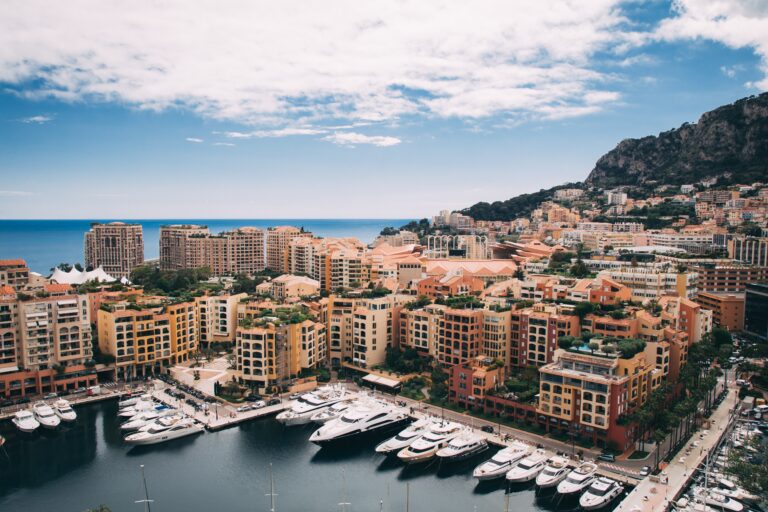The Principality of Monaco has long been a magnet for wealthy individuals and foreign investors looking for a tax-friendly environment to do business, invest in real estate, or simply enjoy a high life.
Many clients interested in moving their tax residence to the Principality ask us if foreigners in Monaco have to pay any special taxes compared to nationals or if on the contrary there is any tax regime that is beneficial for foreign residents.
Let’s try to solve these doubts.
NEW REPORT
The report “The definitive guide to living in Monaco” is now available, with detailed information on Monaco’s tax framework, residence and society.
Click here to download it for free.
Monaco taxes at a glance
Main article: Monaco taxes
Unlike many other countries, Monaco does not have a special tax regime for foreigners (non-Monegasques) who are residents in the country.
And this makes perfect sense: on the one hand, taxing a newcomer more would discourage the arrival of foreign HNWIs; on the other hand, taxes are already so low that it is impossible to create ad hoc tax frameworks to attract foreign wealth.
To respond to our customers, the 0% income tax policy fully extends to foreign investors and non-residents who wish to live in the Principality.
However, although there is no income tax, it is worth clarifying that there are some other taxes in Monaco.
Main taxes paid in Monaco
While Monaco is a country almost without direct taxes for individuals, it does have corporate income tax, transfer tax, and VAT. Nevertheless, these are relatively low and are designed to encourage business within the country.
The corporate income tax only applies to businesses that generate more than 25% of their turnover outside of Monaco, promoting local economic activity, and there are generous exemptions during the first few years of activity.
Those who are willing to invest in the country as non-residents will find a country with very low taxes and extremely welcoming:
- No tax barriers: there’s no ‘tax barrier’ to cross-border financial flows in Monaco. This means no withholding tax on dividends, interest, or royalties paid by Monaco-based entities to non-Monaco beneficiaries.
- Capital gains and shareholder benefits: shareholders are not taxable on capital gains incurred upon the sale of shares in a Monaco company. Additionally, no withholding tax will apply in Monaco on director fees and/or dividends paid by the Monaco company.
- Absence of Income Tax: Monaco does not levy income tax on individuals, including foreign investors and non-residents.
- Favorable real estate taxes: while there are no property taxes in Monaco, rental properties are subjected to a 1% tax of the annual rent plus estimated service charges, payable by the tenant. This leasehold duty, however, is manageable with the possibility of paying in installments for contracts lasting more than three years.
With no personal income tax, no tax barriers for cross-border financial flows, favorable policies for shareholders and real estate investors, and a straightforward corporate tax structure, Monaco stands out as a haven for foreign investors and non-residents.
Indeed, the only tax similar to the non-resident income tax is the leasehold duty, which is a tax with a rate of 1% of the rent amount and the costs corresponding to the entire period for which the tenant occupies the property.
This tax must be paid in full when someone registers the tenancy agreement contract. It is mandatory to register the tenancy agreement, under pain of penalties, within the three months that follow the signing of the contract. This tax can not be avoided.
Double taxation treaties
Another important aspect to consider is that Monaco has limited double taxation agreements, which could affect residents with income sources from countries without such treaties.
For example, someone who received dividends from US, a country without a double tax agreement with Monaco, would see their profits taxed at source when starting to collect them from Monaco.
Here are some important countries without a double tax agreement with Monaco:
- United States
- Canada
- China
- Japan
- Russia
- Brazil
- Spain
- Switzerland
- South Korea
Additionally, it’s important to consider the specific tax rules and regulations of other jurisdictions, which have their own set of tax policies on source income. Effective tax planning is crucial in these situations to mitigate potential tax liabilities, please do not hesitate to contact us and we will be happy to assist you.
Obtaining residency
As seen, Monaco’s tax regime proves the Principality’s commitment to fostering a business-friendly environment. Whether you’re looking to retire, buy companies, engage in business, or invest in real estate, Monaco offers a uniquely advantageous platform to grow your wealth in a tax-efficient manner.
Remember, though, that Monaco is a paradise, and all paradises maintain restricted access in order to remain so. The good news is that living in Monaco basically requires one thing: financial capacity.
While Monaco does not offer a traditional “Golden Visa” program, the process to obtain a residence permit is centered on proving that you possess sufficient financial resources to support yourself while living in the Principality.
In many instances, you will be required to open an account with a Monegasque bank and deposit a significant amount, often starting at around €500,000. Once the bank confirms your financial stability, it will provide a letter of recommendation to the authorities, which is a key step in your residency permit application.
There are also alternative ways to prove your financial self-sufficiency:
- Employment: Being hired by a Monaco-based company.
- Business Management: Running a local company that shows clear, verifiable income.
- Family Ties: Joining a spouse or a close relative who is already a legal resident.
Once you obtain your administrative residency, you will receive a document known as the Carte de Séjour, which authorizes your stay in Monaco. Typically, there are three types of residence permits available:
- 1-year permit (Carte de séjour de 1 an): This permit is renewable twice, allowing a maximum of three years of residency.
- 3-year permit (Carte de séjour ordinaire de 3 ans): Similarly renewable twice, this option can provide up to nine years of residency.
- 10-year permit (Carte de séjour privilégiée de 10 ans): Once granted, this permit is renewable indefinitely and is usually available to those who have resided in Monaco for several years.
After an uninterrupted residency of at least ten years, you might even consider applying for Monaco citizenship. However, this is a separate process with additional requirements compared to the standard residence permits.
It’s also important to note that having a residence permit in Monaco does not automatically make you a tax resident. To be officially recognized as a tax resident, especially considering other countries that may claim you as a taxpayer, you must apply for a certificate of tax residence, which will be discussed in the next section.
Minimum stay
Another key factor to consider is ensuring you spend more days in Monaco than in any other jurisdiction. While you don’t always need to adhere to a strict 183-day rule, it’s important to avoid circumstances where foreign tax authorities might claim that your primary residence or “center of life” is elsewhere.
If you spend less than half your year in Monaco, your position as a Monaco tax resident can be further solidified if you have:
- Local Education: Children attending schools in Monaco.
- Domestic Partnerships: A partner who lives with you in the Principality.
- Economic and Personal Ties: Investments in local banks or involvement in a family office, among other connections.
All of these are factors that in case of conflict compute in one direction or another, but to avoid unnecessary we always recommend our clients to spend at least half a year in the Principality.
Thinking of moving to the Principality?
At MonacoAdvisers we have been helping entrepreneurs, high-net-worth individuals, sportsmen and women, and people from the world of cryptocurrencies to transfer their tax residency to Monaco for years.
Our presence and contacts in Monaco make us an ideal travel partner for this arduous task. So if you have questions about Monaco and would like us to help you with the process, please write to us at [email protected] or through the contact form.
If you are interested in changing your tax residence to Monaco, we recommend you to download and read our updated report “The definitive guide to living and paying taxes in Monaco”, available for free below.
Sources
- https://monservicepublic.gouv.mc/en/themes/tax/information/general-information/tax-in-monaco
- https://en.gouv.mc/Policy-Practice/Monaco-Worldwide/International-Tax-Compliance/Tax-agreements-signed-by-Monaco
- https://en.service-public-particuliers.gouv.mc/Residency/Settling-in-Monaco/How-to-obtain-a-residence-permit/Conditions-for-issuing-residence-permits
- https://taxfoundation.org/data/all/global/corporate-tax-rates-by-country-2022/
- https://monservicepublic.gouv.mc/en/themes/housing/access-to-housing/tenancy-agreement/how-to-pay-the-leasehold-duty



 All communications are encrypted and will be treated with absolute confidentiality. Your data will never be shared with third parties.
All communications are encrypted and will be treated with absolute confidentiality. Your data will never be shared with third parties. 




